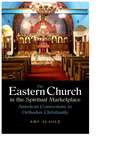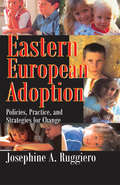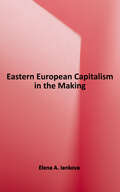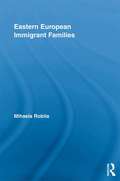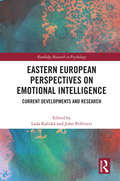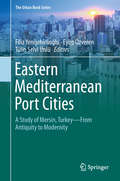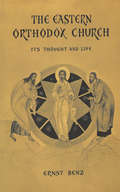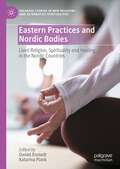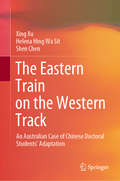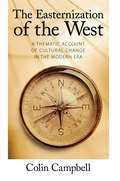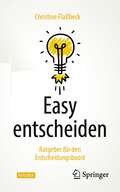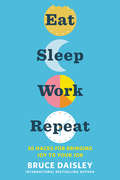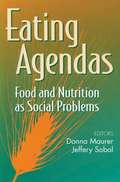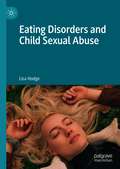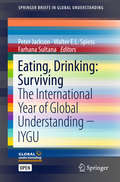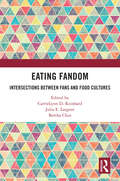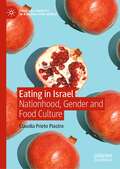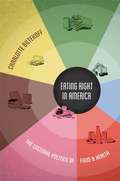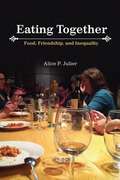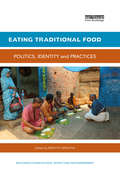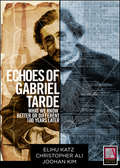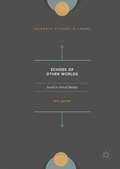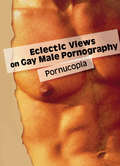- Table View
- List View
The Eastern Church in the Spiritual Marketplace: American Conversions to Orthodox Christianity (NIU Series in Orthodox Christian Studies)
by Amy SlagleLike many Americans, the Eastern Orthodox converts in this study are participants in what scholars today refer to as the \u201cspiritual marketplace\u201d or quest culture of expanding religious diversity and individual choice- making that marks the post-World War II American religious landscape. In this highly readable ethnographic study, Slagle explores the ways in which converts, clerics, and lifelong church members use marketplace metaphors in describing and enacting their religious lives. Slagle conducted participant observation and formal semi-structured interviews in Orthodox churches in Pittsburgh, Pennsylvania, and Jackson, Mississippi. Known among Orthodox Christians as the \u201cHoly Land\u201d of North American Orthodoxy, Pittsburgh offers an important context for exploring the interplay of Orthodox Christianity with the mainstreams of American religious life. SlagleÆs second round of research in Jackson sheds light on the American Bible Belt where over the past thirty years the Orthodox Church in America has marshaled significant resources to build mission parishes. Relatively few ethnographic studies have examined Eastern Orthodox Christianity in the United States, and SlagleÆs book fills a significant gap. This lucidly written book is an ideal selection for courses in the sociology and anthropology of religion, contemporary Christianity, and religious change. Scholars of Orthodox Christianity, as well as clerical and lay people interested in Eastern Orthodoxy, will find this book to be of great appeal.
Eastern European Adoption: Policies, Practice, and Strategies for Change
by Josephine A. RuggieroBetween 1990 and 2006, more than 76,000 children born in Eastern Europe were adopted into American families. Almost two-thirds of these children came from Russia. And in contrast to children adopted from Korea, China, Central America, and South America, most of the Russian children were not infants, but between one and four years old. This volume addresses adoption policies and practices as they pertain to adopted children from Eastern Europe, children who have histories of "pre-adoption adversity." Drawing on her decade-long experience as an adoptive parent of siblings born in Russia and her expertise as an applied sociologist, Josephine Ruggiero examines the central issues involved in international adoptions, focusing on older children as well as siblings, and suggesting needed changes in policy and practice.Regardless of whether children are adopted domestically or internationally, age is a significant factor in their ability to adjust to and function well in their new families. Only about three in ten Russian adoptees joined their new families as infants. Pre-adoption experiences are also significant factors in a child's ability to adjust and function well in a new family. Countries differ in risk factors that may figure into the likelihood of adoptees adapting to life in a new family. Fetal Alcohol Syndrome, serious medical conditions, emotional problems, behavioral problems, attachment issues, learning disabilities, and exposure to family violence must be considered as potential risk factors in adoptions. Pre-adoption adversity is less likely when children come from birth families that are economically poor but have bonded with them.At a time when adoption has finally "come out of the closet" and the definition of the family is changing dramatically, Eastern European Adoption takes a much-needed look at current adoption policies and practices and how well they do or do not work. Ruggiero draws on the literature on older-child and sibling adoption, and data from a questionnaire survey she designed and conducted with 121 adoptive parents. Ruggiero's examples from real adoptive families give a human face to the issues, needs, and strategies she discusses.
Eastern European Capitalism in the Making
by Elena A. IankovaThis book examines the relationships between governments, labor, and business in central and eastern Europe as capitalism develops. The triple forum for social dialogue, termed "tripartism," is a new post-communist species of state-society interaction and a brand of capitalism distinct from American neo-liberalism, western European neo-corporatism, and Japanese statism. Through political negotiations, civic participation, and multi-level bargaining, tripartism institutionalizes--and thereby contains and channels--conflict among post-communist social actors in the industrial arena. Variations in the establishment and functioning of tripartite institutions across central and eastern European countries, industries, and regions reflect differing corporatist legacies and differing paths taken to effect extrication from state socialism. Integration into the international economy and polity, especially European integration, has somewhat diminished differences and, in the long run, is helping preserve and maintain social dialogue structures in the central and eastern European region.
Eastern European Immigrant Families (Routledge Advances in Sociology)
by Mihaela RobilaImmigration from Eastern Europe to the United States has grown significantly in the last few decades. While Asian and Latin American immigrations have been central to the discourse of migration to the US, the rapid growth of Eastern European immigrants has received insufficient attention. Robila fills this gap by presenting key issues related to immigration from Eastern Europe, such as child-rearing beliefs and practices, cultural beliefs, second-generational conflicts, as well as the challenges faced by Eastern European immigrants as they immigrate around the world.
Eastern European Perspectives on Emotional Intelligence: Current Developments and Research (Routledge Research in Psychology)
by Lada KaliskáThis book offers a unique perspective on Emotional Intelligence (EI) research in Eastern Europe, analyzing current trends in the research and application of EI in a region with a distinct socio-political history. Bringing together leading researchers from seven countries, namely Bulgaria, Croatia, Lithuania, Serbia, Slovakia, Poland, and Russia, chapters within this edited volume present original research that illustrates both the etic and emic aspects of emotions, to discuss how EI research can address psychosocial challenges across different societies. Using a selection of cross-cultural frameworks for comparison, contributors to the volume make important developments to the field of EI research by instating a cultural and regional adaptation of EI theories. This includes considerations of EI from a collectivistic perspective as well as the relevance of creating psychological measurement tools that reflect and represent the cultural and linguistic nuances in the adaptive use of emotional information. Eastern European Perspectives on Emotional Intelligence will prove a valuable resource for academics, researchers, and students of cultural and social psychology, or particularly for those seeking to expand their conceptual understanding of EI.
Eastern European Youth Cultures in a Global Context
by Matthias Schwartz Heike WinkelThe demise of state Socialisms caused radical social, cultural and economic changes in Eastern Europe. Since then, young people have been confronted with fundamental disruptions and transformations to their daily environment, while an unsettling, globalized world substantially reshapes local belongings and conventional values. In times of multiple instabilities and uncertainties, this volume argues, young people prefer to try to adjust to given circumstances than to adopt the behaviour of potential rebellious, adolescent role models, dissident counter-cultures or artistic breakings of taboo. Eastern European Youth Cultures in a Global Context takes this situation as a starting point for an examination of generational change, cultural belongings, political activism and everyday practices of young people in different Eastern European countries from an interdisciplinary perspective. It argues that the conditions of global change not only call for a differentiated evaluation of youth cultures, but also for a revision of our understanding of 'youth' itself – in Eastern Europe and beyond.
Eastern Mediterranean Port Cities: A Study Of Mersin, Turkey-from Antiquity To Modernity (The Urban Book Series)
by Filiz Yenişehirlioğlu Eyüp Özveren Tülin Selvi ÜnlüThis book surveys the historical development, current problems and likely prospects for Eastern Mediterranean port cities, providing contributions from scholars from various disciplines, such as archaeologists, historians, economists, urban planners and architects. By studying the city of Mersin and the surrounding area, it offers insights into the changing nature of Eastern Mediterranean port cities.The first part of the book discusses the approaches to the Mediterranean World, from the late prehistory to the present, and questions the implications of the values inherited from the past for a sustainable future. The second part then examines the social structure of Eastern Mediterranean port cities presenting an in-depth study of different ethnic groups and communities. In the third part the changing physical structure of these cities is elucidated from the perspectives of archaeology, architecture, and urban planning. The last part focuses on urban memory through a detailed study based on live recordings of original accounts by the local people. The book benefits prospective researchers in the field of Mediterranean studies, archaeology, history, economic history, architecture and urban planning.
The Eastern Orthodox Church: Its Thought and Life
by Ernst BenzWestern European Christendom finds it difficult to comprehend the Eastern Orthodox Church because it knows little about the practice and doctrines of Orthodoxy. Even what is known is overlaid by many strata of prejudices and misunderstandings, partly political in nature. One of the obstacles has been the natural tendency to confound the ideas and customs of the Orthodox Church with familiar parallels in Roman Catholicism. To escape this tradition pitfall, Ernst Benz focuses on icon painting as a logical place to begin his examination of the Orthodox Church.Beginning with a brilliant discussion of the importance of icons in the Eastern Church--and the far-reaching effects of icons on doctrine as well as art--Benz counteracts the confusion, explaining simply and clearly the liturgy and sacraments, dogma, constitution and law of Eastern Orthodoxy. In brief history, he describes the rise of Orthodox national churches, schismatic churches, and churches in exile; the role of monasticism and its striking differences from Roman Catholic monasticism; the missionary work of the Orthodox Church; and the influence of Orthodoxy on politics and culture.The role of the church can be defined in terms of the image. Benz writes that the church exists so that "members may be incorporated into the image of Jesus Christ a in that individual believers are aechanged into his likeness'" as Paul writes in the second letter to the Corinthians. Thus, Orthodox theology holds up the icon as the true key to the understanding of Orthodox dogma. The Eastern Orthodox Church will be valuable to anyone interested in learning more about the church, its thought, its life, and its ideals.
Eastern Practices and Nordic Bodies: Lived Religion, Spirituality and Healing in the Nordic Countries (Palgrave Studies in New Religions and Alternative Spiritualities)
by Daniel Enstedt Katarina PlankThis volume explores the reception, development and construction of Eastern practices in the Nordic countries. The focus is on spirituality, medicine and healing from a lived religion perspective. Besides a geographical focus on the Nordic countries and their characteristics, this collection examines the embodied practices aligned with different expressions of religiosity, alternative medicine, spirituality and healing practices. By addressing questions about how so-called Eastern practices are embodied, spread and materialized, the contributors shed light on a cultural change in Nordic societies regarding religious, spiritual and alternative health practices, that are sometimes at odds with the dominant medical discourse about life-threatening diseases and other types of conditions.
The Eastern Train on the Western Track: An Australian Case of Chinese Doctoral Students’ Adaptation
by Xing Xu Helena Hing Sit Shen ChenThis book makes valuable theoretical, empirical, and methodological contributions to the study of overseas doctoral students’ cross-cultural adaptation. Focusing on Australia, one of the top three destinations for Chinese students, this book seeks to understand how Chinese doctoral students perceive their lived experience of adapting to the academic and research environment at Australian universities. The book presents an innovative data collection chiefly based on interviews. It probes into Chinese doctoral students’ emic perception of their cross-cultural adaptation from a human development perspective and in three main phrases: how motivated and prepared they are for their overseas stay (planning), how they experience their adaptation as active agents (implementing), and how they evaluate their overseas doctoral journey after the fact (reflecting). Empirically speaking, its findings can help bolster the effectiveness of cross-cultural adaptation and that of the internationalisation of doctoral education. Methodologically speaking, it combines popular techniques and underused instruments such as graphics and maps to offer an in-depth portrait of the issue. Given its content, the book is primarily intended for researchers in cultural studies and practitioners in international education, or in a broader sense for anyone who has a keen interest in how individuals navigate the learning trajectory and construe meanings in unfamiliar academic and socio-cultural settings. Though the book focuses on Australia as a case study, its findings are equally applicable to other contexts.
Easternization of the West: A Thematic Account of Cultural Change in the Modern Era
by Colin CampbellIn this provocative and groundbreaking book, Colin Campbell shows that the civilization of the West is undergoing a revolutionary process of change, one in which features that have characterized the West for two thousand years are in the process of being marginalized, to be replaced by those more often associated with the civilizations of the East. Moving far beyond popular trends, Campbell assembles a powerful range of evidence to show how "Easternization" has been building throughout the last century, especially since the 1960s. Campbell demonstrates how it was largely in the 1960s that new interpretations in theology, political thought, and science were widely adopted by a new generation of young "culture carriers." This highly original and wide-ranging book advances a thesis that will be of interest to scholars in many disciplines in the humanities and social sciences.
Easy entscheiden: Ratgeber für den Entscheidungsboost
by Christine FlaßbeckMit Easy Entscheiden treffen Sie noch vor dem Lesen Ihre beste Entscheidung! Lassen Sie Ängste, Grübeleien und Unsicherheit hinter sich. Treffen Sie ab jetzt Ihre Entscheidungen mit Überzeugung! In diesem Buch wird Ihnen auf leicht verständliche Weise beschrieben, wie vielfältig Sie entscheiden können und wie ein entspannter Umgang mit dem Thema gelingt. Dr. Flaßbeck gibt Ihnen dazu mit Fachwissen und Praxiserfahrung die nötigen Werkzeuge an die Hand, mit denen Sie direkt durchstarten können. Die Autorin hat sich für das Schreiben dieses Buchs entschieden – jetzt müssen nur noch Sie entscheiden, es zu lesen und mehr Klarheit für Ihr ganzes Leben zu gewinnen! Zielgruppen: Dieser Ratgeber ist vor allem für diejenigen, die ihre eigene Entscheidungsfindung verbessern wollen. Weiterhin bietet das Werk denjenigen eine Fülle an Anregungen, die täglich andere in ihren Entscheidungen unterstützen: sei es als Coach oder Trainer_in, Assistenz, Führungskraft, Teamkolleg_in oder von Mensch zu Mensch. Zur Autorin: Dr. Christine Flaßbeck ist Dozentin der Psychologie und selbstständig als Personal- und Organisationsentwicklerin. In Coachings und Trainings hilft sie Menschen u.a. dabei, sich gut und gerne zu entscheiden.
Eat Sleep Work Repeat: 30 Hacks for Bringing Joy to Your Job
by Bruce Daisley“An important reminder of simple everyday practices to improve how we all work together, which will lead to greater team and individual happiness and performance. Great results will follow.”—Jack Dorsey, CEO of Twitter and Square“With just 30 changes, you can transform your work experience from bland and boring (or worse) to fulfilling, fun, and even joyful.”—Daniel Pink, author of When and DriveThe vice president of Twitter Europe and host of the top business podcast Eat Sleep Work Repeat offers thirty smart, research-based hacks for bringing joy and fun back into our burned out, uninspired work lives.How does a lunch break spark a burst of productivity? Can a team’s performance be improved simply by moving the location of the coffee maker? Why are meetings so often a waste of time, and how can a walking meeting actually get decisions made?As an executive with decades of management experience at top Silicon Valley companies including YouTube, Google, and Twitter, Bruce Daisley has given a lot of thought to what makes a workforce productive and what factors can improve the workplace to benefit a company’s employees, customers, and bottom line. In his debut book, he shares what he’s discovered, offering practical, often counterintuitive, insights and solutions for reinvigorating work to give us more meaning, productivity, and joy at the office.A Gallup survey of global workers revealed shocking news: only 13% of employees are engaged in their jobs. This means that burn out and unhappiness at work are a reality for the vast majority of workers. Managers—and employees themselves—can make work better. Eat Sleep Work Repeat shows them how, offering more than two dozen research-backed, user-friendly strategies, including:Go to Lunch (it makes you less tired over the weekend)Suggest a Tea Break (it increases team cohesiveness and productivity)Conduct a Pre-Mortem (foreseeing possible issues can prevent problems and creates a spirit of curiosity and inquisitiveness)“Let’s start enjoying our jobs again,” Daisley insists. “It’s time to rediscover the joy of work.”
Eating Agendas: Food and Nutrition as Social Problems
by Donna Maurer Jeffery SobalThe international group of sociological and nutritional scientists in this volume represent the research that has been conducted on the social problematics of food and nutrition in such areas as food safety, biotechnology, food stamp programs, obesity, anorexia nervosa, and vegetarianism. The broad range of topics addressed and the case studies examined make this book suitable as a course-related text both in foodways and cultural aspects of nutrition and as a new departure in social problems courses.
Eating Disorders and Child Sexual Abuse
by Lisa HodgeThis book takes up the challenge of examining women’s understandings of eating disorders and child sexual abuse away from a framework focused on pathology. The central argument is that women’s distress is an enactment of their engagement with certain discourses and practices, rather than a reaction triggered by child sexual abuse. Guided by a contemporary feminist framework and Mikhail Bakhtin’s sociological linguistics, to substantiate the argument, women’s own poetry and drawings are used as evidence to develop, support and supplement research findings. The book establishes that an eating disorder is ‘an understandable response’ to sexual trauma and shifts the focus away from ‘a damaged personality’. Even more importantly, it demonstrates that women with eating disorders are using their bodies as a form of resistance to express silenced traumas that remain in the silenced female body. This is an active way of making sense of experiences of child sexual abuse.
Eating, Drinking: The International Year of Global Understanding - IYGU (SpringerBriefs in Global Understanding)
by Peter Jackson, Walter E.L. Spiess and Farhana SultanaThis publication addresses the global challenges of food and water security in a rapidly changing and complex world. The essays highlight the links between bio-physical and socio-cultural processes, making connections between local and global scales, and focusing on the everyday practices of eating and drinking, essential for human survival. Written by international experts, each contribution is research-based but accessible to the general public.
Eating Fandom: Intersections Between Fans and Food Cultures
by CarrieLynn D. Reinhard, Julia E. Largent, and Bertha ChinThis book considers the practices and techniques fans utilize to interact with different aspects and elements of food cultures. With attention to food cultures across nations, societies, cultures, and historical periods, the collected essays consider the rituals and values of fan communities as reflections of their food culture, whether in relation to particular foods or types of food, those who produce them, or representations of them. Presenting various theoretical and methodological approaches, the anthology brings together a series of empirical studies to examine the intersection of two fields of cultural practice and will appeal to sociologists, geographers and scholars of cultural studies with interests in fan studies and food cultures.
Eating in Israel: Nationhood, Gender and Food Culture (Food and Identity in a Globalising World)
by Claudia Prieto PiastroThis book explores the relationship between the food culture of Israel and the creation of its national identity. It is an effort to research what the mundane, everyday behaviours such as cooking and feeding ourselves and others, can tell us about the places we were born and the cultural practices of a nation. With the aim of developing a better understanding of the many facets of Israeli nationalism, this ethnographic work interrogates how ordinary Israelis, in particular women, use food in their everyday life to construct, perform and resist national narratives. It explores how Israeli national identity is experienced through its food culture, and how social and political transformations are reflected in the consumption patterns of Israeli society. The book highlights understudied themes in anthropology, food studies and gender studies, and focuses on three key themes: food and national identity construction, the role of women as feeders of the nation, and everyday nationhood. It is a relevant work for researchers and students interested in the study of food, gender, nationalism and the Middle East; as well as for food writers and bloggers alike.
Eating Right in America: The Cultural Politics of Food and Health
by Charlotte BiltekoffEating Right in America is a powerful critique of dietary reform in the United States from the late nineteenth-century emergence of nutritional science through the contemporary alternative food movement and campaign against obesity. Charlotte Biltekoff analyzes the discourses of dietary reform, including the writings of reformers, as well as the materials they created to bring their messages to the public. She shows that while the primary aim may be to improve health, the process of teaching people to "eat right" in the U.S. inevitably involves shaping certain kinds of subjects and citizens, and shoring up the identity and social boundaries of the ever-threatened American middle class. Without discounting the pleasures of food or the value of wellness, Biltekoff advocates a critical reappraisal of our obsession with diet as a proxy for health. Based on her understanding of the history of dietary reform, she argues that talk about "eating right" in America too often obscures structural and environmental stresses and constraints, while naturalizing the dubious redefinition of health as an individual responsibility and imperative.
Eating Together: Food, Friendship and Inequality
by Alice P. JulierAn insightful map of the landscape of social meals, Eating Together: Food, Friendship, and Inequality argues that the ways in which Americans eat together play a central role in social life in the United States. Delving into a wide range of research, Alice P. Julier analyzes etiquette and entertaining books from the past century and conducts interviews and observations of dozens of hosts and guests at dinner parties, potlucks, and buffets. She finds that when people invite friends, neighbors, or family members to share meals within their households, social inequalities involving race, economics, and gender reveal themselves in interesting ways: relationships are defined, boundaries of intimacy or distance are set, and people find themselves either excluded or included.
Eating Traditional Food: Politics, identity and practices (Routledge Studies in Food, Society and the Environment)
by Brigitte SebastiaDue to its centrality in human activities, food is a meaningful object that necessarily participates in any cultural, social and ideological construction and its qualification as 'traditional' is a politically laden value. This book demonstrates that traditionality as attributed to foods goes beyond the notions of heritage and authenticity under which it is commonly formulated. Through a series of case studies from a global range of cultural and geographical areas, the book explores a variety of contexts to reveal the complexity behind the attribution of the term 'traditional' to food. In particular, the volume demonstrates that the definitions put forward by programmes such as TRUEFOOD and EuroFIR (and subsequently adopted by organisations including FAO), which have analysed the perception of traditional foods by individuals, do not adequately reflect this complexity. The concept of tradition being deeply ingrained culturally, socially, politically and ideologically, traditional foods resist any single definition. Chapters analyse the processes of valorisation, instrumentalisation and reinvention at stake in the construction and representation of a food as traditional. Overall the book offers fresh perspectives on topics including definition and regulation, nationalism and identity, and health and nutrition, and will be of interest to students and researchers of many disciplines including anthropology, sociology, politics and cultural studies.
Echoes of Gabriel Tarde: What We Know Better or Different 100 Years Later
by Christopher Ali Elihu Katz Arlene Luck Larry Gross Joohan KimOriginally published in 1898, Gabriel Tarde's essay "Opinion and Conversation" can be read as a series of propositions about the interaction of press, conversation, opinion and action, anticipating today's "deliberative democracy." Exploring these themes in a hyper-text "dialogue" with Tarde, Elihu Katz, Christopher Ali, and Joohan Kim ask what we know better or different 100 years later in this book. The aim is not only to reawaken attention to Tarde's text, but to assess the progress of communications research in its light. The e-book's format makes it possible to access the essay as a series of propositions, foreshadowing contemporary concerns with issues such as agenda setting, public opinion formation, the diffusion of innovation, the two-step flow of communication, the role of the press in nation-building, new media technologies, the normative role of media in a democracy, media events, and the like. The e-book includes an analytic Introduction, a biographical postscript and the first full English translation of Tarde's essay. Long overlooked, "Opinion and Conversation" deserves to be canonized as foundational for theories that link mass and interpersonal communication, especially in the age of social media. Authors are Elihu Katz, Distinguished Trustee Professor of the Annenberg School for Communication at the University of Pennsylvania, Christopher Ali, Assistant Professor of Communication at the University of Virginia, and Joohan Kim, Professor of Communication at Yonsei University in South Korea. Louise Salmon of the Sorbonne (Paris 1) contributed the biographical note.
Echoes of Other Worlds: Sound in Virtual Reality
by Tom A. GarnerThis book explores the nature and importance of sound in virtual reality (VR). Approaching the subject from a holistic perspective, the book delivers an emergent framework of VR sound. This framework brings together numerous elements that collectively determine the nature of sound in VR; from various aspects of VR technology, to the physiological and psychological complexities of the user, to the wider technological, historical and sociocultural issues. Garner asks, amongst other things: what is the meaning of sound? How have fictional visions of VR shaped our expectations for present technology? How can VR sound hope to evoke the desired responses for such an infinitely heterogeneous user base? This book if for those with an interest in sound and VR, who wish to learn more about the great complexities of the subject and discover the contemporary issues from which future VR will surely advance.
Echoes of Trauma and Shame in German Families: The Post–World War II Generations
by Lina JakobHow is it possible for people who were born in a time of relative peace and prosperity to suddenly discover war as a determining influence on their lives?For decades to speak openly of German suffering during World War II—to claim victimhood in a country that had victimized millions—was unthinkable. But in the past few years, growing numbers of Germans in their 40s and 50s calling themselves Kriegsenkel, or Grandchildren of the War, have begun to explore the fundamental impact of the war on their present lives and mental health. Their parents and grandparents experienced bombardment, death, forced displacement, and the shame of the Nazi war crimes. The Kriegsenkel feel their own psychological struggles—from depression, anxiety disorders, and burnout to broken marriages and career problems—are the direct consequences of unresolved war experiences passed down through their families.Drawing on interviews, participant observation, and a broad range of scholarship, Lina Jakob considers how the Kriegsenkel movement emerged at the nexus between public and familial silences about World War II, and critically discusses how this new collective identity is constructed and addressed within the framework of psychology and Western therapeutic culture.
Eclectic Views on Gay Male Pornography: Pornucopia
by Todd MorrisonA unique, multifaceted look at the meaning (and the specifics) of gay male pornographyOpen any "gay lifestyle" magazine (even the serious ones) or go to any gay bar, and you&’re likely to encounter something related to pornography, be it an image of a porn "superstar" or advertisements for pornographic magazines, DVDs, calendars, etc. Eclectic Views on Gay Male Pornography Pornucopia examines this phenomenon with a series of provocative essays, in which experts in history, law, media studies, and psychology, as well as laypeople and gay porn insiders explore the complex world of male pornography and the various ways in which it has permeated gay culture-from the 1970s until today.This first-of-its-kind book examines the phenomenon of self-writing and performance for gay men in the last century, specifically looking at the lives of modern-day performance artist Tim Miller, who has received national recognition for his one-man shows portraying his struggles as a gay man; Wakefield Poole (born 1936), the first producer of gay pornography (Bijou, Boys in the Sand) in the era accompanying the emergence of the gay rights movement; gay adult film icon Scott "Spunk" O&’Hara (born 1961); and Aaron Lawrence (born 1971), who worked as a gay escort, actor, and producer/director of his own sexually explicit "amateur" videos.In this groundbreaking analysis of gay men&’s relationship with pornography, you&’ll also learn about: gay pornography and the messages it carries about intimacy, body image, and hegemonic masculinity representations of ethnicity in gay pornography gay pornography and safer sex gay pornography and censorship viewers&’ perceptions of gay pornography gay pornography and internalized homophobia, misogyny, and body fascism changes in the way gay pornography is produced and performed-from the 1970s through the 1990s the meaning of the recurring settings in American gay pornographic videos: prison, the military, and other all-male environments; and recurring themes: leather, S/M, dissatisfaction with heterosexual life, initiation into gay life, etc. In addition, Eclectic Views on Gay Male Pornography presents two fascinating chapters about the case of Little Sisters Book and Art Emporium in Vancouver. In this landmark case, the Canadian Supreme Court was asked to determine whether gay male pornography violated the sex equality protections guaranteed by the Canadian Charter of Rights and Freedoms. The court also examined the way that Canada Customs treats international shipments to gay and lesbian bookstores. In addition, the book provides a revealing insider&’s perspective on the gay adult video industry that contrasts the workaday reality of making porn with the glamorous mythology of the skin trade.
